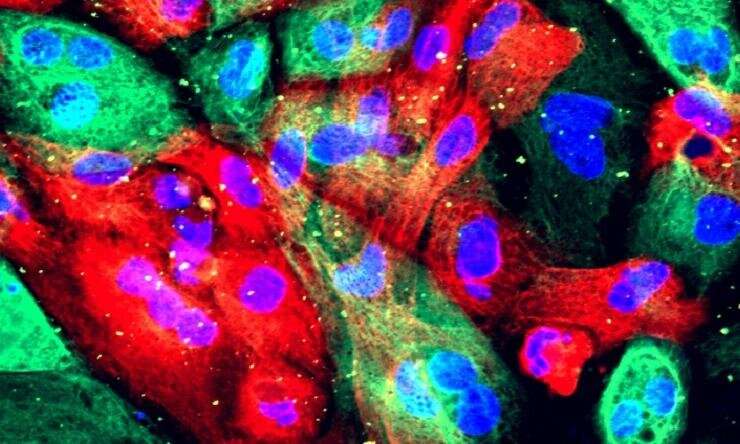This article has been reviewed according to Science X's editorial process and policies. Editors have highlighted the following attributes while ensuring the content's credibility:
fact-checked
peer-reviewed publication
trusted source
proofread
Study validates first-ever predictive AI biomarker of androgen deprivation therapy benefit in prostate cancer

Data from a new study published in NEJM Evidence shows promise for personalized use of short term ADT in men with predominantly intermediate-risk prostate cancer. The study involved ArteraAI, a developer of multimodal artificial intelligence-based predictive and prognostic cancer tests, and other researchers including those from University Hospitals (UH) Seidman Cancer Center. The information validates the first-ever predictive AI biomarker of androgen deprivation therapy (ADT) benefit in prostate cancer.
"This is truly a milestone in the treatment for prostate cancer," said Daniel Spratt, MD, the first author on the study. Dr. Spratt is the Vincent K. Smith Chair in Radiation Oncology and Professor in the Department of Radiation Oncology at UH Seidman Cancer Center and Case Western Reserve University. He is also a member of the Case Comprehensive Cancer Center. "With the first-ever predictive biomarker of ADT benefit in prostate cancer, created with AI, we are able to further realize the ability to create a personalized approach for the treatment of cancer. It is an honor to lead this work in collaboration with NRG Oncology, Artera AI, and dozens of co-investigators. We are fortunate to already be offering this test here at UH Seidman Cancer Center to our patients from Northeast Ohio, our nation and around the world."
The study used novel deep learning methodology and histopathology image data from more than 5,000 patients across five Phase 3 randomized trials, with long-term follow-up. Patients in these trials were enrolled from over 100 centers across the US and Canada. The predictive AI biomarker was developed using datasets comprising about 20% African American patients. In past U.S.-based clinical trials, African American men have made up only 10.8% of prostate cancer trial participants.
Daniel I. Simon, MD, University Hospitals President, Academic & External Affairs and Chief Scientific Officer, and Ernie and Patti Novak Distinguished Chair in Healthcare Leadership said, "We are committed to impactful research that affects patient outcomes in a positive way and this research exemplifies the UH vision of the science of health and the art of compassion that our doctors strive for every day."
Theodoros Teknos, MD, President, and Scientific Director, UH Seidman Cancer Center and the Jane and Lee Seidman Chair in Cancer Innovation echoes those thoughts, "This AI enabled discovery perfectly illustrates UH-Seidman Cancer Center's national leadership in both scientific excellence and innovation. We applaud this important contribution to treatment of prostate cancer."
In patients with localized prostate cancer, ADT can be added to radiotherapy if improved patient outcomes are anticipated. However, ADT is also known to have negative side effects ranging from loss of sexual function to potentially detrimental effects on cardiac and brain health. Some studies suggest many men do not need ADT as part of their treatment plan, and that radiotherapy alone is effective. If given the opportunity to leverage the biomarker, most intermediate-risk patients could potentially avoid the morbidity and financial burden associated with ADT.
Gary Schwartz, MD, Director of the Case Comprehensive Cancer Center said, "The Case Comprehensive Case Center (Case CCC) applauds the leadership provided by Dr. Spratt on conducting this seminal study on using AI technology to predict which population of men with localized prostate cancer will most benefit from the addition of ADT therapy to radiotherapy. This discovery will become practice changing and it will greatly impact the way we approach the treatment of this disease. This work illustrates the leadership that members of the Case CCC provide in the treatment and the advancement of cancer medicine in the United States. The fact that this study includes a high percentage of African Americans, a patient population at very high risk for prostate cancer, also indicates the impact these results will have on an under-represented minority population in the United States."
More information: Daniel E. Spratt et al, Artificial Intelligence Predictive Model for Hormone Therapy Use in Prostate Cancer, NEJM Evidence (2023). DOI: 10.1056/EVIDoa2300023


















